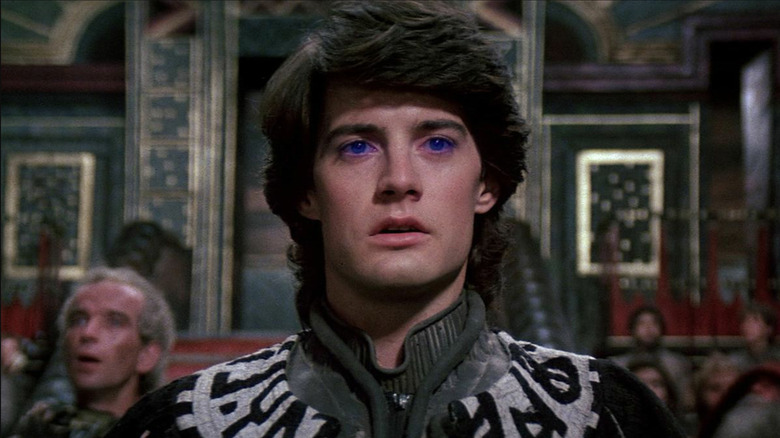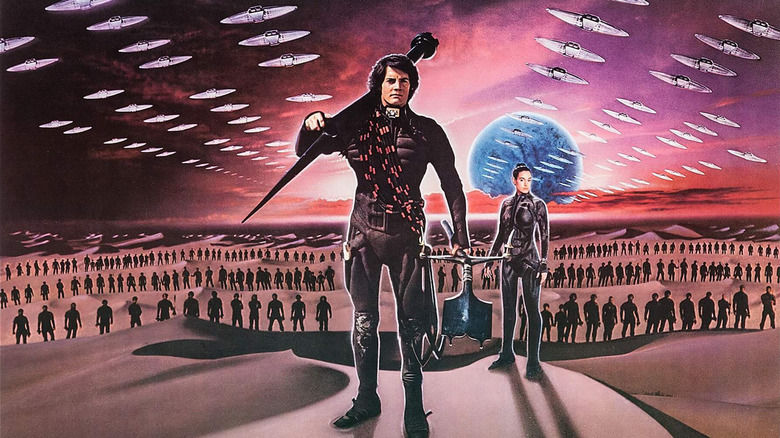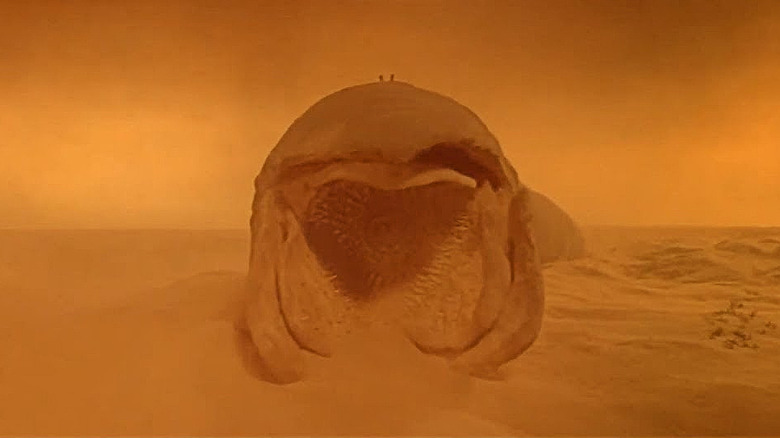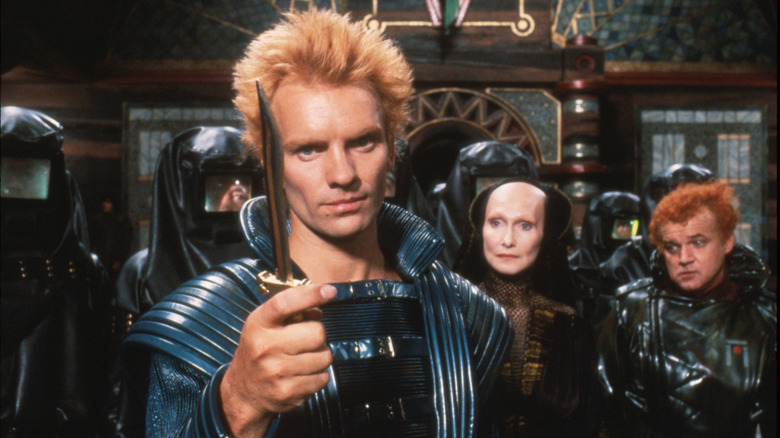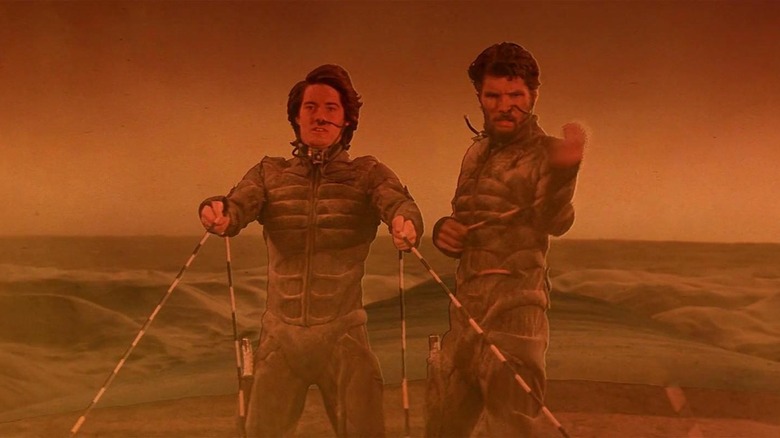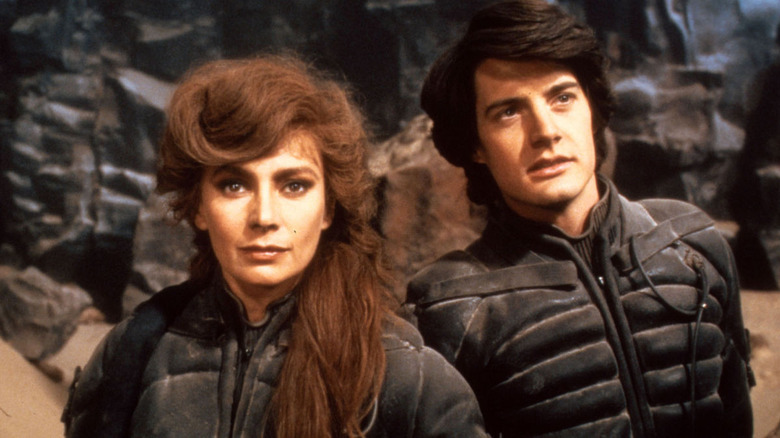David Lynch's Dune Was A Box Office Bomb That Killed A Would-Be Franchise
(Welcome to Tales from the Box Office, our column that examines box office miracles, disasters, and everything in between, as well as what we can learn from them.)
"When I finished the novel. I was just knocked out." Those are the words of filmmaker David Lynch, of "Twin Peaks" and "Eraserhead" fame. The director said this in 2021 reflecting on reading Frank Herbert's "Dune" for the first time. That is, in no small part, why he decided to sign on to direct an adaptation of the novel that had been kicking around Hollywood for years. Unfortunately, for various reasons, Lynch's version was doomed to fail.
"I'd seen 'Star Wars,' of course; but to be honest, I wasn't all that crazy about it," Lynch, who had been eyed to potentially direct "Return of the Jedi," said in that same interview. "Dune was different; it had believable characterizations and depth. In many ways, Herbert had created an internal adventure, one with a lot of emotional and physical textures. And I love textures." Lynch's passion for the material was evident but Herbert's sweeping sci-fi epic was challenging for Denis Villeneuve to tackle even with all of today's technology to bring that universe to life. In 1984? Lynch had far too many limitations to overcome.
In this week's Tales from the Box Office, we look back at Lynch's film in honor of the release of "Dune: Part Two." We look back at how this version came to be, the challenge of trying to squeeze this sweeping story into a two-hour film, how producer Dino De Laurentiis' penny-pinching became a serious problem for the production, what happened when the movie hit theaters, and what lessons we can learn from it all these years later. Let's dig in, shall we?
The movie: Dune (1984)
Herbert's "Dune" became a classic with a devoted following, selling millions of copies in the years after its publication in 1965. After "Star Wars" became a gigantic hit in 1977, it's easy to see why Hollywood would view Herbert's text as a logical target for a box office goldmine. Legendary producer Dino De Laurentiis acquired the rights in the early '80s after producer Arthur Jacobs let the rights lapse. De Laurentiis, rather crucially, negotiated with Herbert for the rights to all the ”Dune” novels, both written and unwritten. That now includes six novels in total.
Herbert himself even tried (and failed) to compress just his first novel into a single script. He wasn't the first to try. Alejandro Jodorowsky tried for years to get the film made, which was chronicled in the documentary "Jodorowsky's Dune." Even before Lynch eventually boarded the project, "Blade Runner" director Ridley Scott spent time developing the project. Scott, speaking in 1994, explained that his brother's death led him to abandon it.
"I couldn't sit around for another two and a half years on 'Dune,' which is how long I thought it was going to take, preparing and waiting on this thing. I needed immediate activity, needed to get my mind off my brother's death."
In short, it was going to be a hulking undertaking. ”My real problem is still squeezing 'Dune' into the length of an ordinary movie,” Lynch said speaking with the New York Times in 1983 in a piece that chronicled the film's difficult production. He couldn't have possibly known just how much of a problem that was going to be. Lynch's "Dune" takes place in 10191. Spice, only found on the desert planet Arrakis, is the most valuable substance in the universe. Duke Leto Atreides is named head of the planet to the chagrin of his bitter enemies, the Harkonnens. They proceed to violently seize control of the planet, leaving it to Leto's son Paul to lead the people of Arrakis in a battle for control of the spice.
A movie too big for its own good
The film required more than 50 speaking roles, some 20,000 extras, nearly 70 sets, and 900 crew members. It was a mammoth undertaking — one that dwarfed the size of Lynch's previous films. Villeneuve's recent adaptation split Herbert's novel into two parts to make it more adaptable. Lynch, on the other hand, tried to cram the whole thing into 137 minutes. Lynch said in a 2019 interview, in reflection, that he arguably never should have made the movie in the first place.
"I started selling out on 'Dune.' Looking back, it's no one's fault but my own. I probably shouldn't have done that picture, but I saw tons and tons of possibilities for things I loved, and this was the structure to do them in. There was so much room to create a world. But I got strong indications from [producer] Raffaella [De Laurentiis] and [EP] Dino De Laurentiis of what kind of film they expected."
In any event, Lynch had a movie to make and he had a lot of roles to cast. For the role of Paul Atreides, Lynch turned to Kyle MacLachlan, whom he would eventually collaborate with again on "Twin Peaks." Many actors tested for the role and, for a good time, it seemed like a then-mostly-unknown Val Kilmer was going to get the part. As explained by production office assistant Craig Campobasso in "A Masterpiece in Disarray: David Lynch's Dune – An Oral History" (via Mashable):
"We screen-tested Michael Biehn, Kevin Costner, Lewis Smith. There were a few others. Val Kilmer, of course, because Val was actually the number one choice up until Kyle did his screen test. Paul-Muad'Dib is not an easy character. Kyle made it look easy, but if you saw all the other actors struggling ... Michael Biehn did not live up to it. Kevin Costner did not."
Nobody could rightfully accuse the cast as being the issue. It also features Virginia Madsen (Princess Irulan), the voice of Chucky himself Brad Dourif (Piter De Vries), and The Police frontman Sting as Feyd Rautha. It was an impressive ensemble.
Problems on Arrakis
De Laurentiis was a famously thrifty producer and, to make "Dune" work on a budget, they handled production in Mexico. In America, it would have cost twice as much to make at that time. ”In Europe, there was no country with enough stage space and a desert. In Hollywood, stage rental alone would have cost $20 million,” Raffaella De Laurentiis said in that '83 New York Times piece. Unfortunately, Mexico brought with it quite a few other problems, erratic electricity being one of them. As De Laurentiis explained at the time:
"We can't sew with the sewing machines, can't make the props, can't use the Xerox machine or the typewriters. Imagine making a picture like 'Dune' with no electricity and one telephone, making the most technical picture ever in a country without technology.”
The movie has enough narrative problems to contend with, from the messy narrated introduction to Sting's "mankini." But the production was downright plagued with on-set issues as well, including rampant illness. ”You do not meet anybody here who isn't ill, about to get ill, or just over being ill,” Francesca Annis, who played Jessica in the film said told the NYT. Be it from food or something else, the cast and crew were sick a lot.
For all of the movie's perceived shortcomings, Lynch did try to do something unique with it. As production designer Tony Masters said to the Times, it was not unlike watching a great artist such as Pablo Picasso doing their thing.
"If David sees anything that looks in any way normal, he wants to change it. He hates anything that looks like 'Star Wars' or any other movie ever made. He comes up with weird ideas that make no sense. When we put them in, they do make sense in the overall scheme. That's what people like Picasso do.”
The financial journey
As thrifty as De Laurentiis tried to be, this Picasso approach still proved to be costly as "Dune" carried a budget of $40 million. That was a massive sum 40 years ago, even if it's considered mid-budget these days. Universal Pictures was on board to distribute the film and, regardless of the challenges, they opted to release the film on December 14, 1984. That pre-Christmas window can be lucrative for the right movie. In fairness, it was extremely lucrative for "Beverly Hills Cop," the movie that Lynch's ambitious sci-fi film lost to on its opening weekend.
"Dune" opened to just $6 million, while Eddie Murphy's breakout comedy smash pulled in another $11.5 million on its second weekend. That movie went on to make a staggering $234 million domestically, kicking off a lucrative franchise for Paramount Pictures. Universal, meanwhile, was on the wrong end of what was shaping up to be a financial mess.
Lynch's movie was out of the top 10 entirely. Critics of the day weren't overly kind to this interpretation of Herbert's work and audiences weren't ready to embrace it either. The movie finished its run with a wildly disappointing $30.9 million domestically, with almost no international ticket sales to speak of. Overseas markets operated a bit differently back then and couldn't always be counted on to bail a movie out. There was no savior here, at least not in the immediate aftermath. That's why Lynch, speaking in 2017, felt that he "died" two times making the movie.
"With 'Dune,' I sold out on that early on, because I didn't have final cut, and it was a commercial failure, so I died two times with that. With 'Fire Walk with Me,' it didn't go over well at the time, but I loved it so I only died once, for the commercial failure and the reviews and things. But, over time, it's changed. So now, people have revisited that film, and they feel differently about it."
The lessons contained within
The saying time heals all wounds seems to apply here. Nothing can save a filmmaker from the pain of pouring one's self into something like "Dune" only to have it disappoint both critically and commercially. It also killed the would-be franchise for literal decades until Warner Bros. and Villeneuve finally found a way to make it work. Let's not forget that De Laurentiis got the rights for all the books, clearly hoping this would be more than a one-off.
But time did catch up to Herbert's legendary vision. Villeneuve, using all of the craft available to modern filmmakers and all of the expertise he's picked up during his impressive career, was able to pull off an adaptation that was both commercially successful and embraced by critics. It may have taken nearly 60 years, but the nut was cracked. If all goes well, Villeneuve will even tackle "Dune Messiah" next.
As for Lynch's movie, time has caught up to that one as well. Even Villeneuve thinks his "Dune" is pretty good. More than anything, viewers have reassessed the movie in the years since its original release. /Film's own Chris Evangelista saw it for the first time in 2021 and, in his assessment, it's far better than its reputation suggests. As he wrote at the time:
"I expected something lacking the filmmaker's distinct style and personality. But 'Dune' very much feels in line with Lynch's other work, and I don't just mean it's 'weird,' which seems to be the go-to description for everything Lynch does. Lynch's 'Dune' is overflowing with the filmmaker's esoteric charms, and the rumbling, grumbling, churning sounds of machinery — something I'm pretty sure Lynch has a fetish for — are always present. But most of all, Lynch's 'Dune' is impenetrable, and I mean that as a compliment."
Heck, even Lynch — who has pretty much never had anything nice to say about the experience — seemed to be coming around to the idea of some kind of director's cut a couple of years ago. Eventually, everything old is new again.
